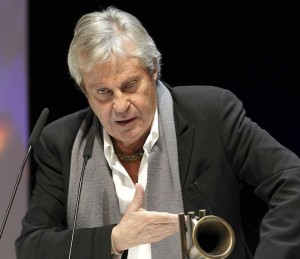
The composer, producer and performer Juan Carlos Calderón died yesterday in Madrid after suffering a heart failure at the age of 74. He was the author of four of the Spanish entries at the Eurovision Song Contest in the 70s and 80s; Eres Tú, Tú Volverás, La Fiesta Terminó and Nacida Para Amar.
Any job related to music found its place in Juan Carlos Calderón talent. He marked an era in the Spanish pop industry after working with a huge list of artists that included Nino Bravo, Julio Iglesias, Cecilia, Luis Miguel and many more.
From a young age, he had a great passion for music and he entered the Conservatory of Music where he studied jazz among other disciplines. Shortly after, in 1968, he achieved his first success with the release of his first album entitled Juan Carlos Calderón Presenta A Juan Carlos Calderón. From there his fame was increasing.
After his success great artists got in touch with him for compositions and arrangements of their songs. He not only knew how to arrange songs to make them massive hits, but he knew how to compose a hit. The key of his success was that he knew how to create songs with apparently simple melodies and sentimental lyrics and that he also found the right performers to sing them.
Calderón was asked to make the arrangements of the 1968 Spanish Eurovision entry La, La, La which won that year’s competition performed by Massiel. Between 1969 and 1980 he was the producer of all the albums from Mocedades and he is also the author of Eres Tú, ranked second at the 1973 Eurovision Song Contest. In 1975 he composed again the song with which Spain participated at the Eurovision Song Contest, Tú Volverás, performed this time by Sergio and Estíbaliz.
The late 70s were a time extremely creative and lucrative for Calderón when he composed some movie soundtracks. But with the new decade, the melodic genre fell into some decline in Spain and, together with some weariness, he made a decision that would give him huge returns: he started to work in Latin America where he achieved tremendous popularity.
After that stage of his life overseas, he came back to Spain and in 1985 he wrote La Fiesta Terminó, performed at the Eurovision Song Contest by Paloma San Basilio. Four years later he participated at the competition again this time with Nacida Para Amar which led Nina to the sixth position. In recent years he has collaborated with the arrangements of the Eurovision entries from Daniel Diges and Lucía Pérez.
The last months of his life became a time to collect awards, including the Prize of Honor of the XIV edition of the Music Awards awarded in 2010 by the Academy of Arts and Sciences of Music.
Our deepest sympathy and sincere condolences go to his family and friends at this sad time.



















